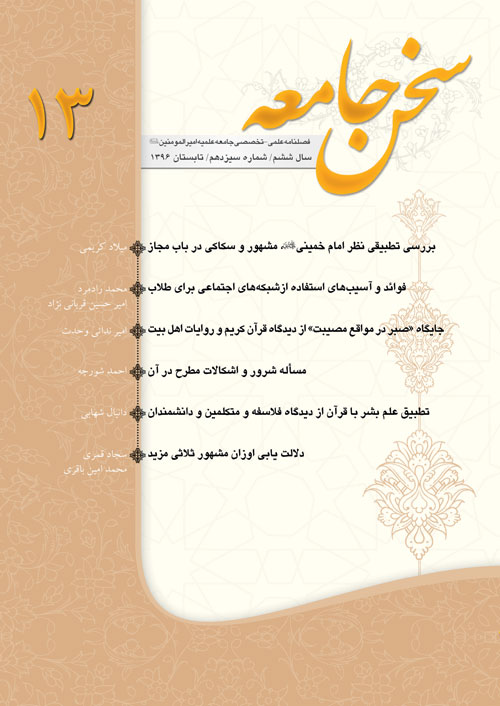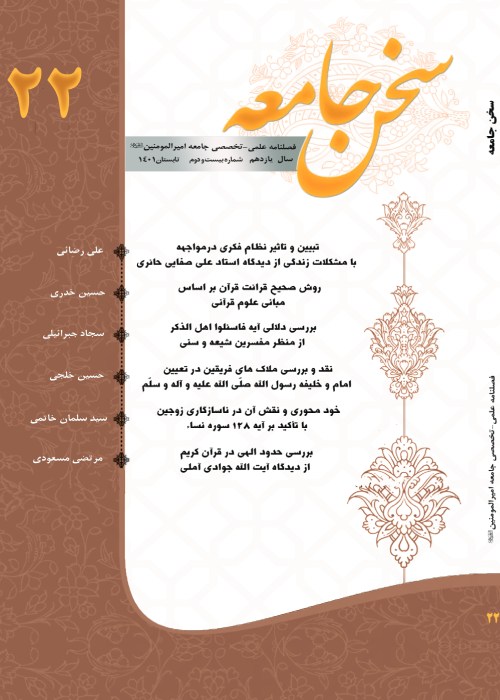فهرست مطالب

فصلنامه سخن جامعه
پیاپی 13 (تابستان 1396)
- تاریخ انتشار: 1396/06/20
- تعداد عناوین: 7
-
صفحه 5
-
صفحه 57
-
صفحه 105
-
Page 7The principals have conducted detailed investigations in order to provide rules for the judgement of judiciary. One of these issues, is the discussion of reality and virtual. With the rightful explanation of Imam Khomeini on metonymy (Majaz) in the scientific societies and the similarity of his views to Sakkakis, this question arises in minds of the scholars that whether Imam Khomeinis opinion the same as Sakkakis or in some ways is different from that? The present article with the full explanation about three viewpoints of Mashhur, Sakkaki, and Imam Khomeini, and comparison and comparative study of these three opinions, aims to investigate their similarities and differences which has
many facets, and express the innovations of Sakkaki and Imam Khomeini. The result of this study is that Mashhur considers using in meaning as real and use in other than meaning as virtual. But, Sakkaki has a new theory. His opinion states that in the metaphor, the use of the term is in meaning , but with the claim that before the serious purpose of the speaker is one of the examples of the meaning of the thing which
is denoted ,Imam Khomeini following his master the late Abu-al-majd Esfahani agreed with Sakkakis opinion but with two basic differences: first, the use of the term in the meaning of the thing denoted is not just in metaphor, but it is the same in all of the metonymies , and second, Sakkaki believed in claim before reference but Imam Khomeini believed in claim after reference. This paper has been conducted with a library-based method and a comparative approach.Keywords: metonymy, Real, subject, Imam, Sakkaki, Mashhur -
Page 19Social networks are one of the tools of the enemies and superpowers to weaken Islam and propagate against Shiism. There are disagreements among the elders and the dominant scholars of the seminaries about the use or not using of these social networks which has cast doubt on some of the seminary students in using it. This article examines the history of these networks and their benefits and damages to the students, and some of the speeches of the leader Imam Khamanei, about the use of seminary students from the social networks, and all of these writings and examination of the benefits
and harms of these networks show that the enemy of Islam and Shiism has done the necessary programs to destroy Islam and in some cases that is successful, but this does not mean that we cannot use this tool against them and finish this cultural war in favor of
ourselves. To reach this aim all the people should take action, especially seminary students, in order to do their mission which is to explain and promote Islamic teachings and to prevent the penetration and influence of foreigners to the best of their abilities, and they inevitably use these networks and tools. Of course, this usage should be in accordance with the terms and conditions of which the most important criteria are having the full knowledge and being scholar in Islamic and religious culture, theology and laws.Keywords: network, social networks, seminary students -
Page 29It is seen less among the people to do the patience in disaster as it is mentioned in Holy Quran and Hadiths of Ahlulbayt. This scarcity has damaged human reach to excellent levels and caused problems to them. this research can partly resolve this problem. In the
first part of this article, entitled Concepts, the concept of patience and its related terms is clarified to the reader and clears the damages caused to patience from the folk point of view. In the second part, the position of patience in adversity is explained to the reader by Quranic verses and hadiths of Ahlulbayt that if people do not moan at the times of calamities and be thankful to Gods blessings and not be proud and be patient in front of the disasters and have the special companionship of God which is with patients and the unfettered description of God, and in the third part the effects and divine gifts is expressed which contains mercy and special divine salavat, guidance and prosperity in the hereafter from Almighty God. In this paper, patience is investigated as one of the sources of happiness and the origin of salvation from disasters and to gain the special Divine salavat and is useful for the seekers of happiness.Keywords: Quran, patience, disaster, Salavat -
Page 57The problem which is discussed in this paper is the problem of evil. This problem has brought about problems in three areas of belief to monotheism, justice, and divine wisdom. The method of conducting this research is library-based studies and collection of
aspects of this discussion from the related books in this field. In general, the issues which will be proved and what will be presented in this paper are briefly as follows:1. Expression of doubtfulness and its problems
2. Review of the three evil which was mentioned, and degeneration of their areas
3. Detailed review of the true nature of evil and the discovery of relativity and its non-existence
4. Response of religious people outside the framework of rational reasoning to this issue
5. The prophecies of Aristotle and Plato, and the comparison between them and the phrases of the elders of the tribe and heads of the tribes in this respect
6. The transformation of the distinction between good and evil and the expression of its effects and benefits And in general the result of this problem that what exists is pure
good or have lots of goodness, and in a more precise way to prove (non-existence of evil) and also non-defection of it from goodness and the statement of the benefits of evil. And the proof of this issue that the existing system, is the best possible system, and this important issue which is the reason for the creation of the imperfect beings, is the kindness of the essence of Almighty Allah.Keywords: monotheism, justice, wisdom, goodness, evil, being, lack (not being), relativity, God -
Page 75The present article represents one of the most important scientific debates of the last two decades, which is the analysis of Quranic verses and the extraction of scientific issues centered on various sciences, including cosmology, physics and quantum, biology, and so on. The present- day human being, due to the large and large-scale development of scientific issues does not believe in the existence of a coherent source which holds all the scientific titles in a correct manner and about one thousand four hundered years ago, so we aim at inferring and presenting this title to the world by the use of the researches of the scholars and other strata of this center like Dr. zaker Naeek and William W. and Dr. Jerad and scientific evidences and related verses the way of extracting
and deducing these issues. First, we refer to the title of the discussion in the verse and then state the verse and analyze and criticize the content of it and explain how thios verse is related to the scientific discussion. Then, we extract the scientific theory from the verses and in case of existing words of scholars and theoreticians we state them and indicate the scientific findings and their astonishment in the presence of scientific
truths in the Quranic verses and even Islamization of some of them. therefore, in this paper it was tried to discuss all the issues scientifically and rationally, in order to prevent any damage to acceptance and inference of the issues.Keywords: Quran, Science, philosophy, scholars, Islam, scientific issues -
Page 105The most essential tools needed by the scholars of the Islamic theology and teachings are fuller understanding of the language of religion, Arabic. On the other hand, the presentation of research in another language requires a good acquaintance with the target language, so that the material can be transmitted to the audience without
contradictions. Given the semantic function of the verbs and the multiplicity of its use in theology, we aim to provide a systematic representation of verbal meanings in this paper. Since the signification of the third order verbs is a simple object (the proof of the
occurrence of event by nature in one of the triple times) , we consider the verbs of Salasi Mazid (third order verbs) to maximize the meanings in the formulas and weights of these categories of verbsseparate from material- (as they are expressed, they have more
complex and advanced meanings than single-degree verbs). Our methodology in this study is as follows: first, we study the opinions of two great Arab spokesmen, Sibouee and Najm al-Din Razi, and quote their poems in the same way; then, in the semantic analysis of each of the abwabs, by summarizing the speeches (including the two scientists mentioned) , we classify the found meanings, and finally they are presented systematically.Keywords: translation, verb, Salasi Mazid (third order verbs)


